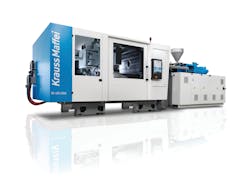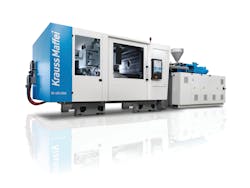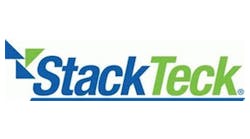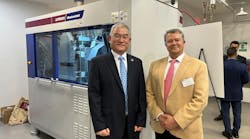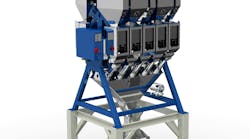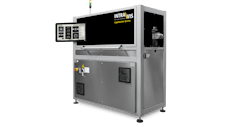Problem: A new contract necessitated the purchase of a large injection molding machine, but the new job alone couldn’t keep the press running 24/7.
Solution: A plug-and-play plasticizing unit that makes product changeovers quick and easy.
Martin Nadeau, president of Plastiques Nadco, a custom injection molder in Granby, Quebec, noticed that automotive customers increasingly were requesting very large parts.
Nadeau purchased two hydraulic KraussMaffei injection molding machines in 2017 — a 275-ton machine as part of an ongoing upgrade at the 70,000-square-foot plant, and a 660-ton press to meet the demand from the new contract.
However, the contract for the new industrial part would not be able to keep the new 660-ton press running at full capacity. He decided to use the press also to produce packaging that had previously been made on another machine. However, frequent changeovers between the two product lines on the new molding machine were disruptive to production.
“We decided to order a new plasticizing unit for custom molding the industrial product with an engineering-grade resin,” Nadeau said. “We ordered a special barrel and screw that works as a plug-and-play unit.”
The machine generally runs for one to two weeks manufacturing the industrial product, and, when the plant needs to switch over to produce the packaging on the same machine, the switch-over is now quick and simple, Nadeau said.
“When we need to schedule the packaging product, we put the [other] plasticizing unit in and the injection molding machine recognizes the new unit and is able to begin production right away,” he said. “We only have two plugs to install, so we can easily go back and forth producing one product and then the other.”
The company built a rack next to the press to store the plasticizing unit that is not in use.
“All we have to do is plug in the electrical cable and the computer on the molding machine recognizes the shot size and all the technical information that has been stored to perform the proper setup.”
The company ordered the extra plasticizing unit from KraussMaffei, which set up all the software so that the molding machine recognizes each unit and knows what product to produce.
“The extra unit was equipped to run the program we need,” Nadeau said. “We didn’t have to do anything because KraussMaffei handled all the programming. We are very pleased that this large press can produce the thin-wall packaging product in a fast, 10-second cycle, and the engineering- grade resin part with the longer cycle. The transition is now seamless.”
KraussMaffei said this is achieved through software programming. The molding machine software reads an encoder on the plasticizing unit and recognizes the plasticizing unit size, allowing it to automatically make the needed adjustments to produce the alternate product. The switch-over can take anywhere from 10 minutes on a 38-ton machine to an hour or two on a 4,400-ton machine.
KraussMaffei offers compatibility with plug-and-play plasticizing units as a standard feature on its injection molding machines. Machines can be fitted with up to 12 different plasticizing units. The software is programmed so that the molding machine cannot run a wrong-size unit. Processors that need to perform frequent changeovers to produce different products on the same machine may find this to be a useful option.
For Nadeau, purchasing the additional plasticizing unit was an easy decision.
“I don’t want to see the machine sitting there doing nothing when it is not being used to make the industrial-grade part,” he said. “Adding an interchangeable injection unit made buying the machine profitable. I didn’t need to find a new customer to keep the machine running. I could keep it running making plastic buckets when it was not making the industrial parts.
“KM gave me the opportunity to make the machine profitable during the first year instead of waiting for a new contract from a new customer. It also gives me a lot of flexibility as a custom molder. You have to be flexible in this business and have a variety of customers to keep your machines running. You need to be able to do more than one job on each machine. This gives me the flexibility I need to take on new jobs and to keep the press running.”
Nadeau said he has ordered two additional presses from KraussMaffei, with clamping forces of 220 tons and 275 tons, for delivery later this year. The company now operates 15 injection molding machines with clamping forces ranging from 100 tons to 745 tons. Seven of the presses are made by KraussMaffei and eight are made by Wittmann Battenfeld. The company also makes parts for the medical, agricultural, sports and leisure, commercial packaging and pharmaceutical industries. It operates 24 hours a day, five days a week.
Bruce Adams, senior staff reporter
Contact:
Plastiques Nadco Inc. Granby, Quebec, 450-777-7654,
